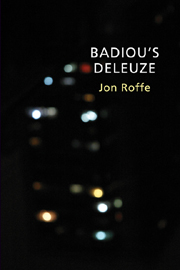2 - Is Deleuze a philosopher of the One?
Summary
The claim that orients Badiou's entire reading of Deleuze is infamous: “This philosophy is organized around a metaphysics of the One” (DCB 17/30). As philosopher of the One, Badiou claims that Deleuze has for the most part been remarkably successful. We are dealing therefore not with a failed or impossible philosophical project, but one that Deleuze has more or less successfully executed on behalf of contemporary thought. The closing lines of The Clamor of Being invoke Deleuze as “truly a most eminent apostle” (DCB 102/150) of the Spinoza for whom Being is radically unary in nature. If, as I shall come to argue, Badiou's argument on this point fails, then the veracity of the rest of his reading of Deleuze is profoundly challenged.
The next few pages endeavour not themselves to argue for this conclusion, but to initiate a procedure of testing, in which Badiou's claims about Deleuze are brought into contact with the Deleuzean text. As we proceed, an increasingly rich picture of Deleuze will allow us to make a progressively more refined set of determinations about both Badiou's Deleuze and Deleuze's thought itself.
PORTRAIT OF DELEUZE AS A NEO-PLOTINIAN
The argumentative chain by which Badiou asserts this fundamental claim of his reading of Deleuze is founded upon what the former describes as a kind of pre-ontological move or decision on Deleuze's part, and is elaborated according to what Badiou characterizes as the “two abstract theses in which this principle is unfolded” (DCB 24/39).
- Type
- Chapter
- Information
- Badiou's Deleuze , pp. 6 - 23Publisher: Acumen PublishingPrint publication year: 2011



